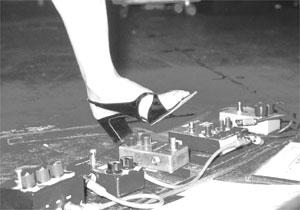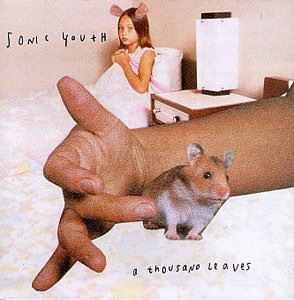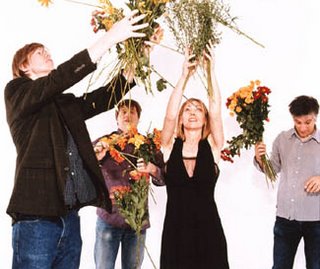Hits of Sunshine

by Michael Strenski
I have stumbled upon an interesting phenomenon. I work at a movie theatre and as one would expect many of the conversations with my co-workers tend to revolve around film. A favorite question of mine when meeting someone new is: what was the last great Woody Allen film? Across the board, everyone I ask goes at least as far back as 01997's Deconstructing Harry. I then inquire after a film released a full two years' post-Harry, 01999's Sweet and Lowdown. A sparkle of recognition plays across the person's face and they almost always acknowledge the greatness of Sweet and Lowdown. They just forgot about it. I often alternate between worrying about and cherishing the forgotten gems like Sweet and Lowdown. I feel an inherent need to spread the wealth and beauty but at the same time, I enjoy feeling like part of a very small contingent that found the treasure and will never forget.
This brings me around to Sonic Youth. Everyone loves Sonic Youth. The majority of listeners do not love everything Sonic Youth has ever done, but even your mom can enjoy "Theresa's Sound World", and your eight-year old cousin really, really digs "My Friend Goo". Like most people I discovered the band around the time I became a teenager. By that point I had completely given myself to Nirvana, and after listening to In Utero for the zillionth time, I decided to search out one of the bands that Kurt had raved so much about. Sonic Youth were the first step in the direction of the underground. They were the key to Lightning Bolt, to Melt Banana, and a billion other diverse and challenging bands. And as I write this over a decade later, Sonic Youth remain the guardians of that threshold to a host of newly-minted teenagers.
My first exposure was Dirty and I immediately fanned my way out from there. For every newly-released Sonic Youth record I bought two of their earlier works. Soon I had amassed a Sonic Youth library that to this day still intimidates the rest of my record collection (okay, I just checked the CDs and the Melvins beat out the Youth by two albums, twenty-seven to twenty-five). For a long, long time Sonic Youth retained a position in my musical standings that no other band was afforded. I listened to them almost exclusively for months' on end, which only happens with the greatest of bands. I harbor an incredibly intense memory of lying in bed at my mother's house listening to Daydream Nation with my eyes closed. It was the first time I had ever consciously decided to let the vocals, drums and other instruments fade away and just follow one of Sonic Youth's guitars through an entire jam. Visions poured across my mind, everything seemed so incredibly beautiful to me. It was the first time that I can remember concentrating so hard on a fragment of a song. This was what I pictured classical music to be for other people.
Enter A Thousand Leaves.
In 01998, Sonic Yout h released another album, just like they had done every other year on average since 01981, the year I was born. At first listen, A Thousand Leaves seemed like an obvious extension of the direction the band had been headed with their previous album Washing Machine, extending the jams and letting the guitars really take off. But the thing with this album was that after each listen it seemed to unfold itself in vastly new directions. Unlike any album before, there were a multitude of avenues to explore. It seemed so all-encompassing. A Thousand Leaves has its Sonic Youth-patented pop songs ("Sunday") and its rockers ("the Ineffable Me"), but the jams on this album were at the forefront, more so than they ever would be again. My friends and I took to the album like a drug. We dubbed the album onto cassette and played it in a boombox wherever we went. There is a guitar skronk at exactly three minutes and five seconds into the song "French Tickler" that might be my favorite moment in a piece of recorded music ever. I seriously considered A Thousand Leaves to be the best album of all time for a while.
h released another album, just like they had done every other year on average since 01981, the year I was born. At first listen, A Thousand Leaves seemed like an obvious extension of the direction the band had been headed with their previous album Washing Machine, extending the jams and letting the guitars really take off. But the thing with this album was that after each listen it seemed to unfold itself in vastly new directions. Unlike any album before, there were a multitude of avenues to explore. It seemed so all-encompassing. A Thousand Leaves has its Sonic Youth-patented pop songs ("Sunday") and its rockers ("the Ineffable Me"), but the jams on this album were at the forefront, more so than they ever would be again. My friends and I took to the album like a drug. We dubbed the album onto cassette and played it in a boombox wherever we went. There is a guitar skronk at exactly three minutes and five seconds into the song "French Tickler" that might be my favorite moment in a piece of recorded music ever. I seriously considered A Thousand Leaves to be the best album of all time for a while.
The thing is no one else seemed to think so. I remember Rolling Stone giving it a terribly lackluster review which further cemented my disdain for said magazine. I met other Sonic Youth fans who just didn't think much about it. To them, it was just another Sonic Youth album, something they bought the week it came out, listened to a few times and then shelved away with their other albums, rarely giving it another thought. It was more a part of the collection, less a masterwork by four forward-thinking, musical gods from New York City. This brings me to the Woody Allen idea explored earlier. Was A Thousand Leaves destined to become another Sweet and Lowdown? For a long time, that most definitely appeared to be the case.
In an historical nutshell, shortly after completing A Thousand Leaves, almost all of Sonic Youth's custom guitars that they had been using and oddly-tuning for over a decade were stolen. The band was forced to acquire new gear and focus on new work. In my mind this was both blessing and curse. The thought of starting all over seemed great for a band like Sonic Youth who always appeared to be aspiring to do so, the sad part was that the following work was in my opinion, the worst of their career. The three albums that came directly after A Thousand Leaves were all disappointments, the first time I had ever experienced that with Sonic Youth. The last two in this trilogy, Murray Street and Sonic Nurse only had one good song between them, but what an amazing song it is. Lee Ranaldo's "Karen Revisited" is one of the greatest the band has ever done, an amazingly beautiful piece with sincere, honest lyrics that was wholly out of place amidst records that were bogged down in faux-beat poetry and simply put, utterly boring moments. Here's the crux: the first set of Sonic Youth LPs that I could not honestly enjoy were being heralded as a return to form by Rolling Stone, and by their imitators and detractors alike.
I bided my time. I never completely lost faith in Sonic Youth although there were times when things looked incredibly bleak. I had unwillingly turned into the people before me, buying the latest album, listening to it a couple times and then relegating it to the bottom of the stack. I have known for years that I will always buy the new Sonic Youth album no matter how bad it is, because I feel like I owe it to a band that opened so many doors in my adolescent brain about what a band, a song, or art could be. Thankfully, I was rewarded for my loyalty this year when the band released their fifteenth full length, the exquisite Rather Ripped. In almost every way, the new album is the antithesis of A Thousand Leaves, the songs on Rather Ripped are concise, catchy pop songs, some of the poppiest of the band's entire career. Compare that to the former album that has three songs that clock in at over nine minutes, and a song that has Kim Gordon calling the name Alice repeatedly through a noise that recalls life in a wishing well. It doesn't matter. The band sounds invigorated again. And guess what?
Most of the reviews of the new album cite it as a return to form. A return to the greatness of such albums as...A Thousand Leaves. That's what they're saying. This delayed validation gives me hope that justice will be meted out in the long run for all of the other neglected classics.
It just takes time.




The last good Scorsese picture? This is tough because the Bobby baby documentary was pretty durned good but as for narrative it might just be KUNDUN.
ReplyDeleteWe just watched GOODFELLAS one of the first nights here in Seattle and it did not live up to my memory: too much voice-over detailing exactly what was depicted onscreen. It's not as ingratiating as CASINO but still, after the first 90 minutes I was getting tired. I just kept thinking, Why make this movie? But that could be its own post...
How do you feel about THE DEPARTED?